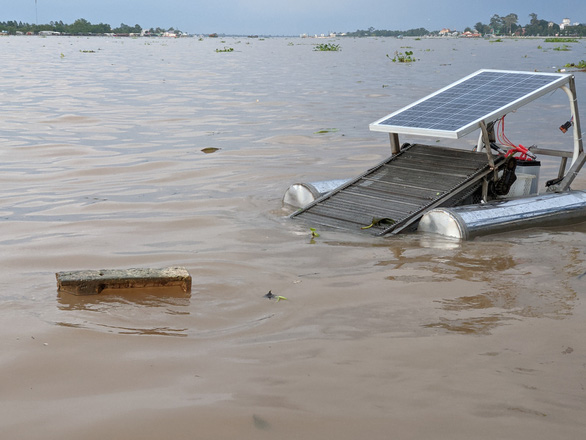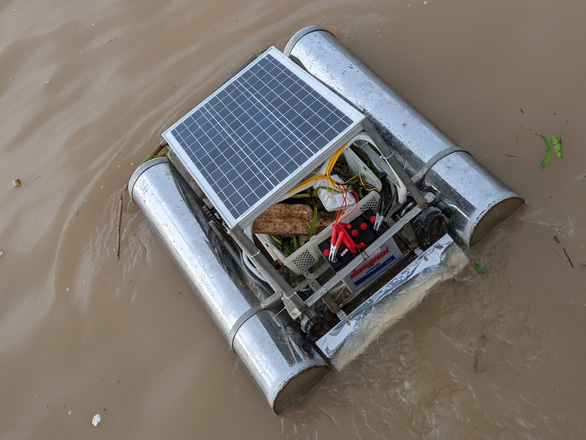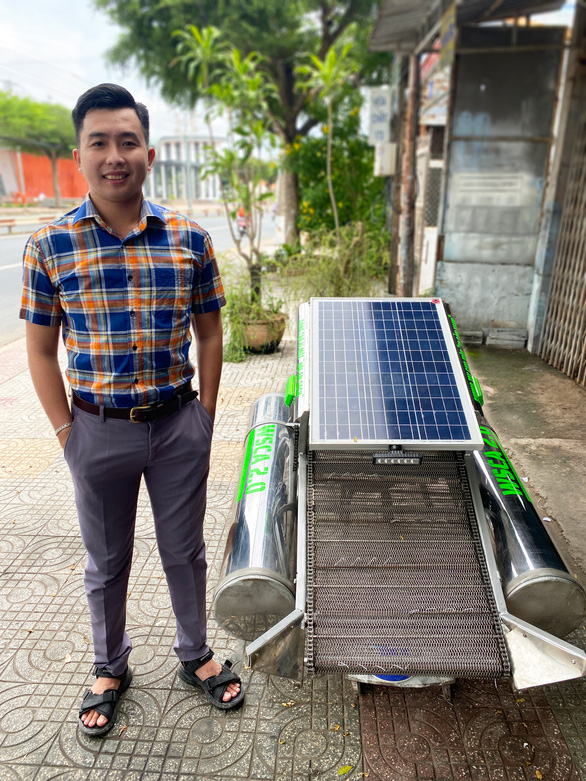Huynh Ngoc Thai Anh, a 31-year-old lecturer in the Mekong Delta region of Vietnam, has created a solar-powered trash collector made from discarded materials. His idea won first prize in an innovation contest organized by UNESCO in 2020.
The machine, WSCA2.0, floats along a river, picking up lightweight garbage, including plastic bags, bottles and boxes, paper and organic waste.
Its creator, Thai Anh, currently works at Can Tho University in Can Tho City, around 160 kilometers to the southwest of Ho Chi Minh City.
The device is powered by solar panels and operated through a smartphone.
Its appearance in the Youth Innovative Ideas for an Ocean without Plastic Program hosted by UNESCO in 2020 attracted all members of the judging board and brought home the first prize for its maker.
|
|
| The solar-powered trash collecting device is seen with trash gathered inside of it in this supplied photo. |
After weighing up various types of materials and the efficiency of spare parts, Anh made the machine two years ago, but has only recently put it into use due to the impact of the COVID-19 pandemic on Vietnam.
WSCA2.0 is built from recycled materials, which are cost-effective and environmentally friendly.
“I ran tests with different recycled materials and trialed the use of solar energy,” said Anh.
“I calculated its buoyancy when operating on lakes and rivers.
“Besides, I was taking advice from my seniors and relied on my own expertise to make the machine controllable by a smartphone.”
After many field tests, WSCA2.0 is now complete.
The trash collector has a frame and floats on it, a conveyor net and chain enhanced by inoxidable material and stainless steel, a propeller powered by a built-in accumulator battery chargeable by solar panels.
It also has a lighting system and navigation light for operation in the dark.
|
|
| Huynh Ngoc Thai Anh, the 31-year-old maker of WSCA2.0, which is created from recycled materials, stands next to his machine in this supplied photo. |
Users can simply drive the machine to the area of trash using their smartphones.
Trash will be sucked into a garbage compartment inside the machine, which is now in use in the Hoai River of Quang Nam Province in central Vietnam, where it is proving rather effective.
The creator is preparing to file a patent for WSCA2.0.
“With more funding or sponsorship, I will produce more of these and put them into use in places like touristic areas with lots of rivers and lakes,” said Anh.
“This will help to clean Vietnam’s environment.
"With WSCA2.0, I simply try to send out the message that if I can do it, then other young people in Vietnam can.
“They are totally capable of creating environmentally friendly products and take pride in things that are ‘made in Vietnam.'
“We Vietnamese can produce practical products like people in other countries, as long as we take a stride forward with confidence."
According to Tran Nguyen Minh Thu, head of the computer science department at Can Tho University, Anh’s creativity is highly regarded by his employer, who provides the most conducive environment for his research and training.
“Thai Anh is a passionate lecturer and much loved by his students,” she said.
“He particularly supports his undergraduates in their scientific research projects.”
Like us on Facebook or follow us on Twitter to get the latest news about Vietnam!


















































